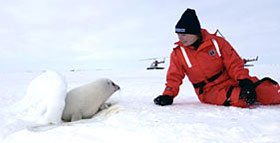 |
 |
 |
 Editorials | Environmental | April 2005 Editorials | Environmental | April 2005  
Cyber Environmentalists Act from Labrador Peninsula to Baja Peninsula
 Talli Nauman - The Herald Mexico Talli Nauman - The Herald Mexico


| | It's as easy to get involved as sitting at the computer. So why not? It's all possible through cyber activism. After all, one good turn deserves another. Click HERE to start right NOW! |
Many are the times that environmentalists from around the world have answered Mexican pleas for support of domestic causes. It is heartening to see that now conservationists in Mexico are taking up the banner for an issue far from home.

They have joined the ranks of the international campaign to stop the killing of baby harp seals born in Canada in the springtime after their parents migrate there through the arctic waters from Greenland.

This year's seal hunt was expected to deal the death blow to some 320,000 of these marine mammals, constituting what may be the beginning of the biggest seal hunt in history. It is a blow, indeed, since the defenseless young are commonly shot or bludgeoned to death with a club. Their carcasses sometimes are abandoned on the ice, as the killers make off with the furs, in a scene reminiscent of the days when bison bounty hunters nearly exterminated the great beast of the North American plains.

The market for this luxury item is so minimal that it is subsidized by the government. But the Canadian Parliament has again legalized the baby seal massacre, exhibiting its members' lack of humanity and concern for biodiversity. Authorities say they need to cull the population to protect fish stocks and provide jobs in economically depressed Newfoundland. Well, I've got news for them: Other options for poverty relief and managing wildlife are available. They should promote sustainable development.

In addition to a letter-writing campaign to the legislators, Greenpeace has initiated a drive to convince Canada's prime minister to intervene and end the annual slaughter. The Humane Society of the United States is urging a boycott of Canadian seafood, since the enterprises that catch fish are the same ones that hunt seals. The International Fund for Animal Welfare is just another of several groups that have solicited Mexican support.

I remember as a child how I was moved when I learned of this brutal and seemingly senseless killing. I was surprised when activists circulated information that it continues to the present, after the seals were nearly driven to the brink of extinction in the past century.

It pains me to think that as I write these words today, the carnage on the Labrador Peninsula is just getting underway. Some 95,000 seals have already become victims of this year's hunt, which began when the season opened elsewhere on March 29. When it's over it will have been to blame for helping wipe out the largest quota of seals authorized in a season since 1971. What's more, the quantity being taken is not based on any up-to-date census of the population and is scientifically indefensible.

That should bring the cause of the baby seals' salvation close enough to home in Mexico. But if it still seems a far-fetched crusade, it is no more a stretch of the imagination for environmentalists in Canada or other parts of the world to answer Mexico's simultaneous call to the aid of the Xantus murrelet, a humble-looking water bird in danger of extinction off the Baja Peninsula.

The Coronado Islands there host the world's largest colony of this small, black-and-white species whose members also live in southern California. Mexican activists are asking for international support for creation of a Natural Protected Area on the islands for this and several threatened bird species. The Mexican Congress has endorsed the demand. But more pressure apparently is needed to convince the administration to take action.

It's as easy to get involved as sitting at the computer. So why not? It's all possible through cyber activism. After all, one good turn deserves another.

Talli Nauman is a founder and co-director of Journalism to Raise Environmental Awareness, a project initiated with support from the MacArthur Foundation. She is a program associate at the Americas Program of the International Relations Center. (talli@direcway.com) | 
 | |
 |



